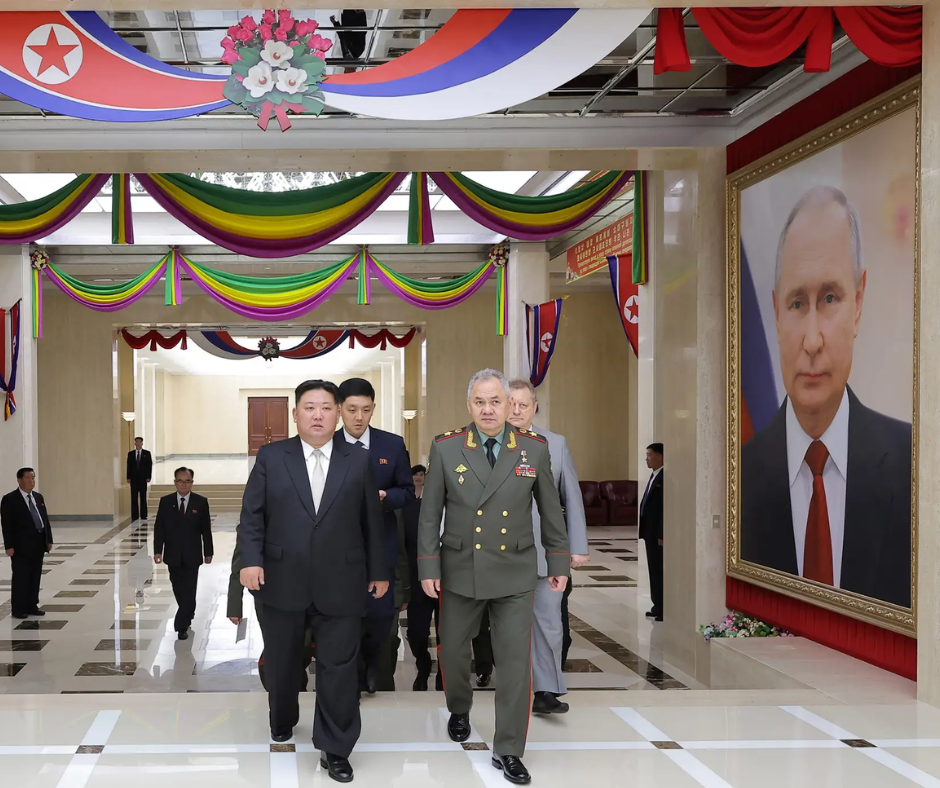North Korean leader Kim Jong Un has been showing off his close ties to Russia and China in recent weeks. In images released by state media, Kim can be seen touring a state office building with Russian Defense Minister Sergei Shoigu and meeting with a Chinese delegation.
The North's decision to invite the Russian and Chinese delegations highlights the strengthening of this trilateral bloc while South Korea makes parallel moves to strengthen military cooperation with the U.S.
The increasingly aggressive posture and lack of interest in partnerships other than those with China and Russia also leave the North with few options for trade or aid to address growing food shortages exacerbated by international sanctions.
North Korea has been facing food shortages, which have been made worse by its border closure and strict international sanctions that have been imposed because of its nuclear program.
North Korea has never been able to produce enough food for its 26 million people. North Korea has been receiving regular rice and grain shipments from China and Russia in a likely attempt to relieve food shortages.
A Far East Russian region delivered over one thousand tons of wheat flour to North Korea in June, according to the Russian government, the latest in a series of shipments publicized since earlier this year.
Kim and Shoigu also visited a weaponry exhibition that included nuclear-capable missiles and new military drones. At a reception held for the Russian delegation, Shoigu said the North Korean army "has become the strongest army in the world" and expressed "the will of the Russian Federation to boost many-sided cooperation with D.P.R.K." -- the Democratic People's Republic of Korea, North Korea's official name.
Kim also met with Li, who delivered a personal letter from Chinese leader Xi Jinping. Kim said Xi's decision to send a delegation "showed the general secretary's will to attach great importance to the D.P.R.K-China friendship." China's Foreign Ministry echoed the sentiment at a news conference the same day.
Putin has also been praising North Korea, thanking the country for its support of Russia's war in Ukraine. In a speech on Friday, Putin said that Russia and North Korea are "aligned on key international issues" and that he plans to bolster security, economic, and political ties with Pyongyang.
The deepening ties between North Korea, Russia, and China are raising concerns about the security of the Korean Peninsula. North Korea has been developing nuclear weapons and missiles for decades, and its provocations have become increasingly brazen in recent months. Experts worry that deepening ties between North Korea and Russia and China could lend some legitimacy to the rogue state and credence to its nuclear ambitions.
From a Geopolitical Perspective
From a Christian Perspective
In a recent article by Voice Of the Martyrs Korea's director, David Kim he said that people often think of "North Korea Ministry" as supplying the country with what it lacks: food, human rights, and even movies on USB and DVDs. However, Kim argues that VOM Korea's ministry begins with what North Korea has: one of the strongest churches in the world, growing faster in numbers than the South Korean church.
Christianity is considered subversive and is brutally opposed in North Korea. Anyone discovered to be a Christian or to express any interest in Christ or the Bible is considered an enemy of the state. The gospel is still proclaimed in North Korea through various creative means, including shortwave radio and bold evangelists who risk their lives to smuggle Bibles and discipleship resources into the country.
If discovered, Christians face harsh persecution from the government and from members of the community, who are required to serve as government informants. Even those who are aware of Christian activity but do not report it to the government are punished as enemies of the regime.
As the quote highlights, the most distinct church growth in terms of per capita growth occurs in countries like North Korea, where the church is forced to overcome adversities and persecution and stand in contrast to the Church in the "free" world, particularly in its approach to Church growth.
While we experience the freedom of well-organized outreach and evangelizing programs, often employing a seeker-sensitive approach, North Korean believers follow a blueprint of church growth through persecution.

